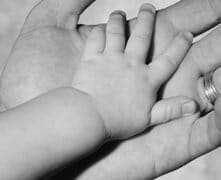
Playing with fire? How to stay safe!
Bipolar pregnancy is a tricky time, but you CAN manage. Risk of bipolar relapse increases. Medication can be dangerous. Get the facts NOW!
1
According to Bipolar Disorder for Dummies, (which incidentally is an excellent book, and is definitely NOT for dummies), there are 3 main challenges involved in bipolar and pregnancy:
1. MEDICATION:
There is a painful cost/benefit analysis that has to be done – many bipolar medications are dangerous for the fetus, but a mom going off her medication MUST have a back-up plan. Often physicians will attempt to transition to the safest single-drug regimen possible.
2. RELAPSE:
Both pregnancy and the aftermath, known as postpartum, are high risk times for mood instability and cycling, even in women with no bipolar history. For women who have been ill in the past, rates of relapse into bipolar mania and psychosis are estimated at 50% to 75%, respectively.
3. STRESS MANAGEMENT:
Even the most common of stressors with a new baby, such as lack of sleep, can catapult a bipolar woman into mania. Again, a treatment plan for your bipolar pregnancy is a MUST.

Discover the secrets
of mood, food & weight
Fast bipolar pregnancy facts
In a hurry? This summary on Bipolar Pregnancy gives a quick and authoritative overview of key issues in bipolar pregnancy. It comes from The Black Dog Institute – a leading health organization specializing in bipolar research and support.
Or see NAMI’s Managing Bipolar and Pregnancy (NAMI is the National Alliance on Mental Illness, and is the nation’s largest grassroots mental health organization.)
Bipolar pregnancy treatment plan
Reminder
Pregnancy with bipolar disorder requires planning and a lot of self-knowledge and insight.
2
What is a treatment plan? It is a plan for the whole nine months of pregnancy, usually divided up by weeks. This plan attempts to cover everything that may come up during the pregnancy, based on what we know about bipolar pregnancy.
The treatment plan involves not just the mother, but also any significant other, or other family and friends who will be involved. It needs to be prepared in consultation with all relevant medical experts who help manage your bipolar, such as psychiatrist, obstetrician, and family doctor.
Some treatments for bipolar such as the various forms of talk therapy pose no danger to the fetus, so one aspect of the plan could be to
increase the level of support through psychotherapy.
If work is stressful then planning time off could be in the plan as pregnancy itself is stressful and can be enough to trigger an episode.
The plan should start with some detective work into family history as this is a strong indicator of possible postpartum depression or psychosis. If these risks are strong the medication strategy will probably be affected.
Based on everything we know about bipolar and pregnancy, the plan should be detailed and specific, so there is a definite strategy planned for each week – for example resuming lithium in week 9 if there are signs of relapse.
Lithium and bipolar pregnancy
The issues for pregnant women using lithium to treat bipolar are mainly about timing:
1. LITHIUM AT THE TIME OF CONCEPTION: There are no known negative consequences to the fetus if the father or mother were taking lithium at the time of conception.
2. THE FIRST 3 MONTHS (1st trimester): There is a risk, which today most experts believe to be quite low, to the fetus if lithium is taken in the first 3 months of pregnancy. The main risk, which seems to occur in about 1 in 2000 births, is of heart and blood vessel defects.
3 (teratogenicity of lithium)
3. FROM 3 – 9 MONTHS: Restarting lithium after the first trimester appears to be safe for the fetus, in general. However, various (sometimes conflicting) studies have linked lithium use in the 2nd and 3rd trimester to Cardiomegaly, Gastrointestinal bleeding, Goiter and hypothyroidism, Hepatomegaly, Nephrogenic diabetes insipidus, Polyhydramnios, Premature labor, and Shock after birth.
4. BREASTFEEDING: It is better NOT to breastfeed while you are taking lithium. Lithium passes through a woman’s body into her breast milk. A baby drinking breast milk from a woman taking lithium would also be taking lithium. Lithium is unsafe for newborn babies.
4 (breast feeding usually contraindicated with lithium use)
Opinions, even amongst experts, about bipolar pregnancy vary. Goodwin and Jamison suggest that the risk to the baby from a manic or postpartum psychotic mother is probably higher than the risks associated with use of lithium during pregnancy, especially for women whose history suggests a high risk of relapse when off lithium for even a few months.
Other medications during pregnancy
A good starting point is the FDA’s Current Categories for Drug Use in Pregnancy.
The categories are copied below, along with details on some drugs relevant to bipolar and pregnancy.
A – Adequate, well-controlled studies in pregnant women have not shown an increased risk of fetal abnormalities.
CLASS A includes the thyroid hormone.
—————————————————————–
B – Animal studies have revealed no evidence of harm to the fetus, however, there are no adequate and well-controlled studies in pregnant women.
or
Animal studies have shown an adverse effect, but adequate and well-controlled studies in pregnant women have failed to demonstrate a risk to the fetus.
CLASS B includes Wellbutrin
—————————————————————–
C – Animal studies have shown an adverse effect and there are no adequate and well-controlled studies in pregnant women.
or
No animal studies have been conducted and there are no adequate and well-controlled studies in pregnant women.
CLASS C includes SSRIs such as Prozac, Zoloft, Celexa, and Lexapro. Also contains Abilify, Effexor, Cymbalta, Tegretol, Trileptal, Paxil, Klonopin, Neurontin, and Lamictal.
—————————————————————–
D – Studies, adequate well-controlled or observational, in pregnant women have demonstrated a risk to the fetus. However, the benefits of therapy may outweigh the potential risk.
CLASS D includes Depakote and lithium, as well as Valium and Xanax.
—————————————————————–
I am not one of those people who believe that having bipolar disorder disqualifies someone from being a parent!
Of course, NOTHING to do with bipolar disorder and pregnancy is going to be as easy as simply looking up drugs on a chart!
Experts such as Goodwin and Jamison warn: “These categories can be quite misleading because they are, by and large, based on data available at the time of the drug’s initial approval.”
In other words, the FDA categories use old, sometimes outdated data. To accurately decide on the risks for medication in bipolar disorder and pregnancy you need more up to date information.
For example, according to the latest evidence, lithium should now be moved to the safer C category, and Tegretol downgraded to a D. Also, as explained
earlier, when lithium is taken is significant – the risk decreases after the first trimester.
All I can say is that if you want to be even reasonably informed about the risks involved for medication in bipolar and pregnancy, YOU MUST see a physician who is an expert in this area and consult an up to date and authoritative text book such as Frederick K. Goodwin & Kay Redfield Jamison Manic-Depressive Illness: Bipolar Disorders and Recurrent Depression, (2nd ed), Oxford University Press, 2007.
Postpartum depression and bipolar pregnancy
For a great overview of postpartum depression, see Taking Care of Both of You: Understanding Mood Changes After the Birth of Your Baby. This is comprehensive but easy to read information from DBSA – the Depression and Bipolar Support Alliance.
The postpartum period is a time for greatly increased risk of relapse, or even onset of more severe bipolar episodes–most commonly, major depression.
5 (bipolar mood swings in the postpartum period)
FAMILY HISTORY is very important! One study of bipolar women found that those with a family history of postpartum psychosis were MORE THAN 6 TIMES MORE LIKELY to have a postpartum episode than those without such a family history. Doing some research into your family history should be an important part of making your treatment plan because this is a scary statistic that will obviously impact decisions such as whether or not to stay on medication.
This clustering of postpartum problems in bipolar families is an interesting aspect of bipolar pregnancy that highlights the need for you to DO SOME DETECTIVE WORK – it will be worth it.
Birth control and bipolar
Both Jim Phelps, M.D. in Why Am I Still Depressed, and Wes Burgess, M.D., Ph.D in The Bipolar Handbook, warn bipolar individuals against the dangers of taking hormones such as progesterone and estrogen. This is because progesterone and estrogen can both trigger mood swings.
6 (potential negative effects on mood by progestins)
There is some evidence of estrogen also being possibly beneficial, but the evidence is contradictory and more research needs to be done.
As oral contraceptives contain estrogen and progesterone, Dr Burgess suggests that women with bipolar disorder consider alternatives such as condoms, IUDs or diaphragms.
As you can see, the challenges in bipolar and pregnancy begin BEFORE conception, and require women to talk to their doctors and plan.
Should bipolar people have babies?

How is that for a provocative headline? However, many people honestly believe that bipolar people should not conceive in the first place. Are you one of them? Either way, you should read on . . . .
I first started thinking about bipolar and pregnancy when I read an unforgettable passage in Kay Redfield Jamison’s wonderful book, An Unquiet Mind.
Dr Jamison is brutally insulted by an LA physician who starkly tells her “You shouldn’t have children. You have manic-depressive illness.”
Dr Jamison, who to put it mildly, is a lot better informed about bipolar disorder than this physician, tells him to go to hell and walks out of his surgery. (She also breaks down sobbing and shaking in her car afterwards, and feels utterly humiliated by the whole encounter.)
Dr Jamison’s perspective, which I share, is that she has lead, on balance, a wonderful life, despite the sometimes horrors of bipolar disorder. She feels grateful for being born and cannot imagine not wanting to pass the gift of life on to someone else. My sentiments exactly!
Bipolar and pregnancy is a controversial topic on which I have heard people with and without bipolar themselves argue passionately.
 Medically reviewed by
Medically reviewed by
4 Comments
I’m 23 and newly engaged. My fiancé’ and I have been talking about the possibility of having kids; more him than me. He’s such a great godfather, brother, son, fiancé’, all the above…but I don’t know if I want kids. Mainly because of my type 1 bipolar disorder. I always would bring up: What if I can’t have kids (infertile; imagine how I’ll take that!)? What if I get postpartum and can’t love my baby? What if I am a bad mom? And worse, what if my baby gets my illness? I’m already a lot to handle. I’ve been off my meds for almost 1 year and only just started relapsing. Crying spells and deep depression…what if this happens during my fiancé? Too much mind racing and I’m just not sure if I can give my love of my life what he wants…what I want..
Hi Ariel,
Firstly, I don’t confess to be any expert in any way shape or form, but seeing as your comment has gone unanswered i will post a response based partly on my limited knowledge of bipolar, and a lot from my heart.
My wife was diagnosed with bipolar today, and I still love her with all my heart. We both want kids, which sounds a little bit different to your situation. With support and planning, you can manage your bipolar and have a child. If it is the path you choose, do your research, consult your doctor, psychiatrist and get some expert advice because it is possible to have a child and manage your mood.
Over the coming weeks, my wife and I will be researching, planning and working together on managing our expectations as parents and the coping mechanisms we will both need. We have discussed adoption as well, it sounds like you love your partner very much and I am sure that could extend to an adopted child who needs it too.
Most importantly, be honest with yourself and with your husband. I wish you all the best and hope you find the love and support from your husband family and friends through your journey.
Dear Ariel, “The first and highest act of love of a mother for her children is found in the character of the man she chooses to father them.” (A quote from my sister). It sounds as if you have chosen a wonderful man and you should be proud you are discussing your fears, hopes and dreams with him in advance. I’m amazed by how many people get married and then discover they have opposing thoughts on deal-breaking issues such as religion, politics, family, children, etc. Now, every good parent worries about the health their baby. (I was on this site because my 24 year old daughter is having another manic episode and I was researching, trying to find a way to help her. I’m worried about her going on Lithium and the possible side effects it can have on babies, should she ever decide to have them.) So, you are correct to be concerned. Don’t let that paralyze you. You do know what to do… get your meds sorted out, talk with your therapist (include your Fiancė), talk with a Obstetrician who has experience with this, take this one step at a time and take some time. These are big issues and you will work your way through them together. You are stronger than you know. You may decide you can’t spend another moment without bringing a new life into the world or you may choose to adopt (no guarantee of family history… everyone has some sort of challenge in life), or you may choose to find your own balance… such as always being the amazing godparents, etc. I just could not let your post go unanswered. I wish abundant blessings and a beautiful future for you! – Noel
I’m currently 7 weeks pregnant with my 2nd. I’m bipolar type 1. I’m crying all the time n my bf says I can be distant. And not to mention I’m going thru a divorce n I have ptsd, borderline personality disorder n anxiety with memory loss. I want my baby so much, but I’m definitely scared that post-partum depression is in my future. What if I can’t love the baby, what if I get so down i can’t do for the child or myself. I’ve never been that low, but I feel something emotionally big coming. I’m scared n I feel alone in a room full of people n all I want is help.